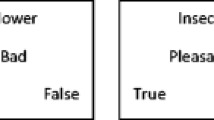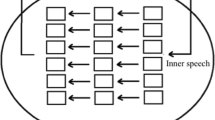Abstract
The current paper represents an attempt to clarify the nature of the radical behaviorist’s perspective on human cognition. This attempt will involve an examination of recent behavioral research into the relationship between stimulus equivalence phenomena and symbolic behavior, and language more generally. This form of behavior analysis is offered as an alternative to, but not a replacement for, other methodological and conceptual approaches to psychology.
Similar content being viewed by others
References
AMERICAN PSYCHOLOGICAL ASSOCIATION. (1988). Thesaurus of psychological index terms (5th ed.). Washington, DC: Author.
BADDELEY, A. D. (1976). The psychology of memory. London: Harper & Row.
BARNES, D. (1989). Behavior-behavior analysis, human schedule performance, and radical behaviorism. The Psychological Record, 39, 339–350.
BARNES, D., & KEENAN, M. (April, 1989). Positive and negative transfer of stimulus functions, and generalization in the control of human schedule performance. Paper presented at the Easter Meeting of the Experimental Analysis of Behavior Group, Cambridge, England.
BARNES, D., McCULLAGH, P. D., & KEENAN, M. (in press). Stimulus equivalence in non-hearing impaired and hearing impaired children. The Analysis of Verbal Behavior.
CANTRIL, H., AMES, A., Jr., HASTORF, A. H., & ITTELSON, W. H. (1949). Psychology and scientific research. Ii. Scientific inquiry and scientific method. Science, 110, 491–497.
CHOMSKY, N. (1959). Review of B. F. Skinner’s Verbal behavior. Language, 35, 26–58.
CLARK, H., & CLARK, E. V. (1988). Psychology and language: An introduction to psycholinguistics. New York: Harcourt, Brace, Jovanovich, Inc.
DEVANY, J. M., HAYES, S. C., & NELSON, R. O. (1986). Equivalence class formation in language-able and language-disabled children. Journal of the Experimental Analysis of Behavior, 46, 243–257.
DIXON, M. (1976). Teaching conceptual classes with receptive label training. Acta Symbolica, 9, 17–35.
DUGDALE, N., & LOWE, C. F. (in press). Naming and stimulus equivalence. In E. Blackman & H. Lejeune (Eds.), Behavior analysis in theory and practice: Contributions and controversies. Brighton, U.K.: Lawrence Erlbaum.
GOSS, A. E. (1961). Verbal mediating response and concept formation. Psychological Review, 68, 248–274.
HAYES, L. J., THOMPSON, S., & HAYES, S. C. (1989). Stimulus equivalence and rule following. Journal of the Experimental Analysis of Behavior, 52, 275–291.
HAYES, S. C. (1987). Contextualism and the next wave of behavioral psychology. Behavior Analyst, 23, 7–22.
HAYES, S. C. (1989). Nonhumans have not yet shown stimulus equivalence. Journal of the Experimental Analysis of Behavior, 51, 385–392.
HAYES, S. C. (in press). A relational control theory of stimulus equivalence. In L. J. Parrott & P. N. Chase (Eds.), Dialogues on verbal behavior. Reno, NV: Context Press
HAYES, S. C., & BROWNSTEIN, A. J. (1986). Mentalism, behavior-behavior relations, and a behavior-analytic view of the purposes of science. The Behavior Analyst, 9, 175–190.
HAYES, S. C., & HAYES, L. J. (1989). The verbal action of the listener as a basis for rule-governance. In S. C. Hayes (Ed.), Rule-governed behavior: Cognition, contingencies, and instructional control (pp. 153–190). New York: Plenum.
HAYES, S. C., HAYES, L. J., & REESE, H. W. (1988). Finding the philosophical core: A review of Stephen C. Pepper’s World Hypotheses. Journal of the Experimental Analysis of Behavior, 50, 97–111.
HUME, D. (1817). A treatise of human nature. London: Thomas and Joseph Allman.
LEAHEY, T. H. (1987). A history of psychology: Main currents in psychological thought. Englewood, NJ: Prentice-Hall.
LEE, V. L. (1988). Beyond behaviorism. Hillsdale, NJ: Lawrence Erlbaum.
LEWIS, D. K. (1972). General semantics. In D. Davidson and G. Harmen, (Eds.), Semantics of natural language. Dordrecht: Reidel.
MACKAY, H. A., & SIDMAN, M. (1984). Teaching new behaviors via equivalence relations. In P. Brooks, R. Sperber, & C. McCauley (Eds.), Learning and cognition in the mentally retarded (pp. 493–513). Hillsdale, NJ: Lawrence Erlbaum.
MAHONEY, M. J. (1989). Scientific psychology and radical behaviorism. American Psychologist, 11, 1372–1377.
MALTZMAN, I. (1955). Thinking: From a behavioristic point of view. Psychological Review, 62, 275–286.
MILLER, L. (1988). Behaviorism and the new science of cognition. The Psychological Record, 38, 2–18.
MOORE, J. (1981). On mentalism, methodological behaviorism, and radical behaviorism. Behaviorism, 9, 55–77.
MORRIS, E. K. (1988). Contextualism: The world view of behavior analysis. Journal of Experimental Child Psychology, 46, 289–323.
OSGOOD, C. E. (1957). A behavioristic analysis of perception and language as cognitive phenomena. In J. S. Bruner, E. Brunswik, E. Festinger, F. Heider, K. F. Muenzinger, C. E. Osgood, & D. Rapaport, Contemporary approaches to cognition (pp. 57–79). Cambridge, England: Cambridge University Press.
OSGOOD, C. E. (1956). Behavior theory and the social sciences. Behavioral Science, 1, 167–185.
PEPPER, S. C. (1942). World hypotheses: A study in evidence. Berkeley: University of California Press.
PREMACK, D. (1976). Intelligence in apes and man. Hillsdale, NJ: Lawrence Erlbaum.
REESE, H. W. (May, 1984). Historical and philosophical analysis of causality Paper presented at the meeting of the Association for Behavior Analysis, Nashville, TN.
REESE, H. W. (1989). Rules and rule-governance: Cognitive and behavioristic views. In S. C. Hayes (Ed.), Rule-governed behavior: Cognition, contingencies, and instructional control (pp. 3–84). New York: Plenum.
ROBINSON, P., & TIERNEY, K. (April, 1990). Stimulus equivalence formation and general anxiety. Paper presented at the Spring meeting of the Behavior Analysis in Ireland Group, Dublin, Ireland.
SCHNAITTER, R. (1987). Behaviorism is not cognitive and cognitivism is not behavioral. Behaviorism, 15, 1–11.
SIDMAN, M. (1971). Reading and auditory-visual equivalences. Journal of Speech and Hearing Research, 14, 5–13.
SIDMAN, M. (1977). Teaching some basic prerequisites to reading. In P. Mittler (Ed.), Research to practice in mental retardation, II. Baltimore: University Park Press
SIDMAN, M., RAUZIN, R., LAZAR, R., CUNNINGHAM, S., TAILBY, W., & CARRIGAN, P. (1982). A search for symmetry in the conditional discriminations of rhesus monkeys, baboons and children. Journal of the Experimental Analysis of Behavior, 43, 21–42.
SIDMAN, M., & TAILBY, W. (1982). Conditional discrimination versus matching to sample: An extension of the testing paradigm. Journal of the Experimental Analysis of Behavior, 37, 5–22.
SKINNER, B. F. (1938). The behavior of organisms: An experimental analysis. New York: Appleton-Century-Crofts.
SKINNER, B. F. (1945). The operational analysis of psychological terms. Psychological Review, 52, 276–281.
SKINNER, B. F. (1953). Science and human behavior. New York: Macmillan.
SKINNER, B. F. (1957). Verbal behavior. New York: Appleton Century-Crofts.
SKINNER, B. F. (1974). About behaviorism. New York: Knopf.
SKINNER, B. F. (1977). Why I am not a cognitive psychologist. Behaviorism, 5, 1–10.
SKINNER, B. F. (1985). Cognitive science and behaviorism. British Journal of Psychology, 76, 291–301.
STEELE, D. M. (1987). Teaching the relations same, opposite, and different. Unpublished doctoral dissertation, University of North Carolina, Greensboro.
WATSON, J. B. (1913). Psychology as a behaviorist views it. Psychological Review, 20, 158–177.
WATT, A., KEENAN, M., BARNES, D., & CAIRNS, E. (1991). Social categorization and stimulus equivalence. The Psychological Record, 41, 33–50.
WESSELLS, M. G. (1982). A critique of Skinner’s views on the obstructive character of cognitive theories. Behaviorism, 10, 65–84.
WETHERBY, B., KARLAN, G. R., & SPRADLIN, J. E. (1983). The development of derived stimulus relations through training in arbitrary matching sequences. Journal of the Experimental Analysis of Behavior, 40, 69–78.
WULFERT, E., & HAYES, S. C. (1988). Transfer of conditional sequencing through conditional equivalence classes. Journal of the Experimental Analysis of Behavior, 50, 125–144.
ZETTLE, R. D. (1990). Rule-governed behavior: A radical behavioral answer to the cognitive challenge. The Psychological Record, 40, 41–49.
ZURIFF, G. E. (1985). Behaviorism: A conceptual reconstruction. New York: Columbia University Press.
Author information
Authors and Affiliations
Additional information
Earlier versions of this material were presented at the 1990 Annual Student Conference of the Psychological Society of Ireland and at the 1990 Spring Meeting of the Behaviour Analysis in Ireland Group.
Rights and permissions
About this article
Cite this article
Barnes, D., Holmes, Y. Radical Behaviorism, Stimulus Equivalence, and Human Cognition. Psychol Rec 41, 19–31 (1991). https://doi.org/10.1007/BF03395091
Published:
Issue Date:
DOI: https://doi.org/10.1007/BF03395091




